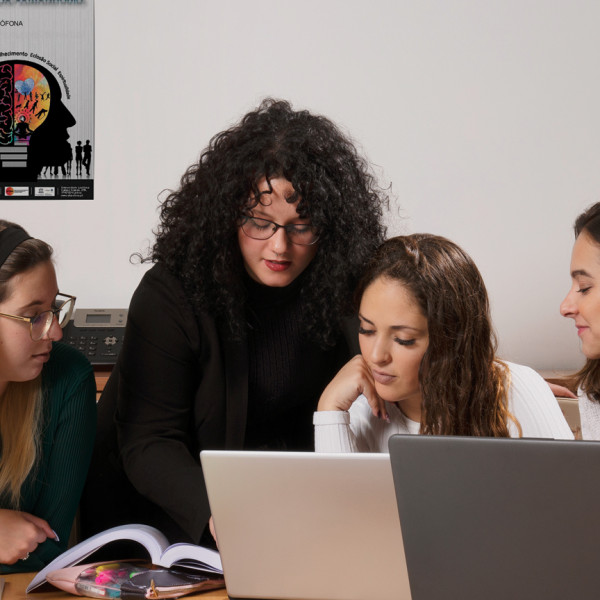Scholarships
- DGES Scholarship - Directorate-General for Higher Education
- Merit Scholarships
- Excellence Scholarships
- Doctoral Scholarships
- Scholarships for Students from CPLP Countries
- European Union Scholarships
DGES Scholarship - Directorate-General for Higher Education
Students at Universidade Lusófona have the opportunity to apply for scholarships from the Directorate-General for Higher Education (Ministry of Science, Technology and Higher Education), which aim to support students who are financially disadvantaged.
The evaluation of scholarships for UL students is managed by the University itself, through the SAS, in compliance with the provisions established in the Regulation for the Awarding of Scholarships to Higher Education Students (RABEEES).
These scholarships consist of an annual financial grant to contribute towards the costs of attending 1st and 2nd cycle degree courses, completing a compulsory professional internship, and a possible supplementary accommodation allowance for displaced students.
For more detailed information, please consult the DGES website.
Applications for DGES Scholarships
The application for a Scholarship is made online via the BeOn Platform.
You must request access credentials (username and password) at the Social Action Service, either in person or by contacting:
- Universidade Lusófona - Lisbon University Centre - siga@ulusofona.pt
- Universidade Lusófona - Porto University Centre - sas@ulusofona.pt
Find out here how.
Before starting the application, it is recommended that you carefully read:
- Regulation for the Awarding of Scholarships to Higher Education Students
- The application instructions/information, available in the Practical Guide for Scholarship Application
- And the Frequently Asked Questions
DGES Scholarships for Students with a Disability Degree Equal to or Greater than 60%
Students with a disability degree equal to or greater than 60% may apply for a scholarship regardless of their household’s financial situation.
The scholarship corresponds to the tuition fees actually paid by the student, up to a maximum annual amount of €2,750.
Eligibility conditions:
- Be enrolled and registered at a higher education institution in a degree-awarding course;
- Provide proof of disability through a multi-purpose disability certificate;
- Have their tax and social security status regularised.
For more information, consult the information available on the DGES website or contact us.
Applications for the Scholarship are made online via the DGES Portal. Apply here.
Support Office for Students with Special Educational Needs - GAENEE
Find information about the support provided by the Support Office for Students with Special Educational Needs - GAENEE here.
Merit Scholarships
Universidade Lusófona encourages its students to raise their level of knowledge and academic performance in higher education.
Merit Scholarships are awarded annually to students with the highest average grades from the previous year.
Scholarships are determined by the University services; no application is required.
For more information, consult the Regulation for the Awarding of Merit Scholarships - 2025/2026
Excellence Scholarships
Universidade Lusófona fosters Excellence!
Excellence Scholarships are awarded annually to the best students entering a degree-awarding course.
Scholarships are determined by the University services; no application is required.
For more information, consult the Regulation for the Awarding of Excellence Scholarships - 2025/2026
Doctoral Scholarships
Interested in pursuing a Doctorate?
Watch the video below about the Doctoral Scholarship Programmes that Universidade Lusófona offers to outstanding students across various fields of knowledge.
The application process for the Universidade Lusófona Doctoral Scholarship Programme is carried out at the time of application to the respective Doctoral programme.
Applicants for the doctoral programme must select the option "I wish to apply for a Doctoral Scholarship" when applying.
Applications for the Doctoral Scholarship Programme do not have a separate application deadline.
The following Doctorates are covered by the Universidade Lusófona Scholarship Programme:
- Doctorate in Architecture
- Doctorate in Media Arts and Communication
- Doctorate in Communication Sciences
- Doctorate in Communication and Activism
- Doctorate in Law
- Doctorate in Education
- Doctorate in Physical Education and Sport
- Specific Rules for Physical Education and Sport 2022/2025 - Lisbon
- Specific Rules for Physical Education and Sport 2023/2026 - Lisbon
- Specific Rules for Physical Education and Sport 2024/2027 - Lisbon
- Application Form - Doctoral Scholarship in Physical Education and Sport
- Doctorate in Computer Science
- Doctorate in Sociomuseology
- Doctorate in Clinical Psychology, Cognitive-Behavioural Orientation
- Doctorate in Urbanism
Scientific Employment and Research Scholarships
-
Doctoral Scholarship Programme - Triennium 2025/2028 Lisbon and Porto
Download (PDF) -
Doctoral Scholarship Programme - Triennium 2024/2027 Lisbon and Porto
Download (PDF) -
Doctoral Scholarship Programme - Triennium 2023/2026 Lisbon and Porto
Download (PDF) -
Doctoral Scholarship Programme - Triennium 2022/2025 Lisbon
Download (PDF) -
General Regulation of the Doctoral Scholarship Programme Lisbon
Download (PDF) -
Doctoral Scholarship - Centre for Intervention and Research in Performance Psychology and Sport Lisbon
Download (PDF)
European Union Scholarships
The European Funding Guide operates via an algorithm that only presents scholarships, funding, and awards that truly match the individual profile of each student. The 12,000 available support programmes cover a broad range of areas for which university students can apply for financial support. This support covers daily expenses, tuition fees, and additional costs for semesters abroad, language courses, and costs associated with scientific projects.
More information at www.european-funding-guide.eu











